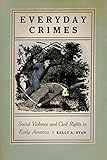Everyday Crimes : Social Violence and Civil Rights in Early America / Kelly A. Ryan.
Material type: TextPublisher: New York, NY : New York University Press, [2019]Copyright date: ©2019Description: 1 online resourceContent type:
TextPublisher: New York, NY : New York University Press, [2019]Copyright date: ©2019Description: 1 online resourceContent type: - 9781479869619
- 9781479872510
- Civil rights -- United States -- History
- Violence -- Social aspects -- United States
- Violence -- United States -- History
- POLITICAL SCIENCE / Civil Rights
- African Americans
- American Revolution
- Amos Broad
- Apprentice
- Civil rights
- Cruelty
- Divorce
- Emancipation
- Free African Americans
- Human rights
- New Netherland
- New York Manumission Society
- Nonviolence
- Patriarchy
- Resistance
- Self licensing
- Servants
- Slavery
- abolition
- antislavery
- bond for peace
- colonial America
- doctrine of coverture
- freedom suits
- gradual emancipation
- legal history
- revolutionary America
- riot
- servitude
- slave uprising
- spousal assault
- wife abuse
- 303.60973 23
- HN90.V5 R93 2019eb
- online - DeGruyter
| Item type | Current library | Call number | URL | Status | Notes | Barcode | |
|---|---|---|---|---|---|---|---|
 eBook
eBook
|
Biblioteca "Angelicum" Pont. Univ. S.Tommaso d'Aquino Nuvola online | online - DeGruyter (Browse shelf(Opens below)) | Online access | Not for loan (Accesso limitato) | Accesso per gli utenti autorizzati / Access for authorized users | (dgr)9781479872510 |
restricted access online access with authorization star
http://purl.org/coar/access_right/c_16ec
The narratives of slaves, wives, and servants who resisted social and domestic violence in the nineteenth centuryIn the early nineteenth century, Peter Wheeler, a slave to Gideon Morehouse in New York, protested, "Master, I won't stand this," after Morehouse beat Wheeler's hands with a whip. Wheeler ran for safety, but Morehouse followed him with a shotgun and fired several times. Wheeler sought help from people in the town, but his eventual escape from slavery was the only way to fully secure his safety. Everyday Crimes tells the story of legally and socially dependent people like Wheeler-free and enslaved African Americans, married white women, and servants-who resisted violence in Massachusetts and New York despite lacking formal protection through the legal system. These "dependents" found ways to fight back against their abusers through various resistance strategies. Individuals made it clear that they wouldn't stand the abuse. Developing relationships with neighbors and justices of the peace, making their complaints known within their communities, and, occasionally, resorting to violence, were among their tactics. In bearing their scars and telling their stories, these victims of abuse put a human face on the civil rights issues related to legal and social dependency, and claimed the rights of individuals to live without fear of violence.
Mode of access: Internet via World Wide Web.
In English.
Description based on online resource; title from PDF title page (publisher's Web site, viewed 01. Nov 2023)


